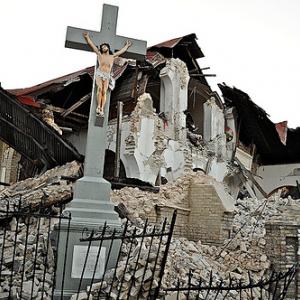Sheldon C. Good, a former Sojourners media assistant, is associate director of Eastern Mennonite University's Washington (D.C.) Community Scholars' Center. He is a graduate of Goshen (Ind.) College and a member of Salford Mennonite Church.
Posts By This Author
Reimagining Christmas
CHRISTMAS, ON THE surface, looks like the most wonderful time of year—the season of love, lights, carols, candles, and family reunions, the time when Christians celebrate the birth of Jesus Christ. Look a bit deeper, though, and one might notice a more idolatrous narrative shining just as brightly: consumerism.
From Black Friday to New Year’s Day, we are inundated with the commercial demands of Christmas. For many, the list of things to do and gifts to purchase can seem endless. We buy into the mantra that the more money we spend, the more love we convey. We become lost in crowded stores, endless websites, and credit card debt. Christians often struggle to faithfully observe Advent, a time of waiting and preparation for the miraculous birth of Jesus.
While many of us purchase this spurious version of Christmas, a new movement has been born. It’s called Advent Conspiracy (AC), and its participants are seeking to turn Christmas upside down by exchanging consumption for compassion.
“Advent Conspiracy is not a four-point checklist on how to do Christmas. If anything, it’s a chance for us to rediscover the wonder and the mystery of the incarnation and what that means to us personally and what that might mean for the world,” said Greg Holder, lead pastor of The Crossing church in the St. Louis area.
The Demonization of 'Terrorism'
The recent explosions at the Boston Marathon and subsequent media coverage exposed yet again a dangerous trend in U.S. culture: rushing to judgment in labeling and prosecuting crimes, and throwing away long-held U.S. American ideals and legal principles of due process.
Terrorism — a form of communication and a military tactic, not an ideology — is the systematic use of violence against civilians to intimidate them for a political purpose. Too many media outlets, elected officials, and community leaders have prematurely labeled the Boston Marathon bombing an act of terrorism. Some people were upset President Obama did not label the acts "terrorism" in his address just hours after the explosions.
NYT Magazine Article Misleads on D.C.'s 'Economic Boom'
Annie Lowrey's recent New York Times magazine article "Washington's Economic Boom, Financed by You" provides a stimulating look into Washington, D.C.'s "economic boom" of the last few years. As D.C. residents, many of us encounter the ongoing transformation of our city every day. We know the area's economy has grown about three times as much since 2007 as the country — largely a result of expanded government spending (primarily in the form of two foreign wars). We also know that the greater metropolitan region is one of the richest in the country. As Lowrey noted, the Washington metro area has seven out of the top 10 highest-income counties in the U.S., including the three highest.
However, Lowrey only tells one side of the story — the rich side. The "economic boom" has largely passed by D.C.'s poor and working people. By not mentioning D.C.'s grossly high poverty rates, the article is misleading.
Amid Washington's economic boom, there is also massive economic displacement, increased economic inequality, and higher rates of poverty.
A Call to Conversion
AS LARRY WATSON arrived by charter bus at the Corrections Corporation of America in Nashville, Tenn., apprehension pulsed through his body. An ex-offender, Watson had been at prison facilities before, but never for this reason—and never willingly.
Watson had been incarcerated three different times—in 1978, 1983, and 1990—for distribution of drugs. The last time, he was sentenced to up-to-30 years in jail. He was released on Jan. 14, 1993, after serving 36 months.
Now he found himself on a very different path. Watson and 17 others, mostly ex-offenders, had trekked nearly 700 miles in May 2010 on a pilgrimage from Washington, D.C., to Nashville. As they pulled into the grandiose Corrections Corporation of America (CCA) headquarters, home to the largest private prison company in the United States, a swarm of security officials greeted them. Watson and his fellow sojourners became increasingly mindful of the spirit in which they journeyed.
Their plan was creatively simple: Purchase a share of stock in the Corrections Corporation of America, the behemoth corporation that owned the private prisons where some of the group had been incarcerated. Attend a CCA shareholders’ meeting. Then, as stockholders, tell their personal stories as a way of witnessing to the “spiritual crisis” occurring within the prison industry, while also building relationships with key CCA personnel.
In essence, using their experience from the inside, members of the group planned to tell CCA how to do its job better.
Two Years After a Devastating Earthquake: Hope for a New Haiti

Port-au-Prince church post-earthquake. Photo by Colin Crowley via Wylio http://www.wylio.com/credits/Flickr/4293703467
How does one dig out from under such tragedy? How does one have hope for a better life, for a new Haiti?
In a meditation titled "The Gates of Hope," Minister Victoria Safford writes:
"Our mission is to plant ourselves at the gates of hope -- not the prudent gates of Optimism, which are somewhat narrower; nor the stalwart, boring gates of Common Sense; nor the strident gates of self-righteousness ... nor the cheerful, flimsy garden gate of 'Everything is gonna be all right,' but a very different, sometimes very lonely place, the place of truth-telling, about your own soul first of all and its condition, the place of resistance and defiance, the piece of ground from which you see the world both as it is and as it could be, as it might be, as it will be; the place from which you glimpse not only struggle, but joy in the struggle — and we stand there, beckoning and calling, telling people what we are seeing, asking people what they see."
Indeed, we need to plant ourselves at the gates of hope and work toward a just peace, on Earth as it is in heaven.

